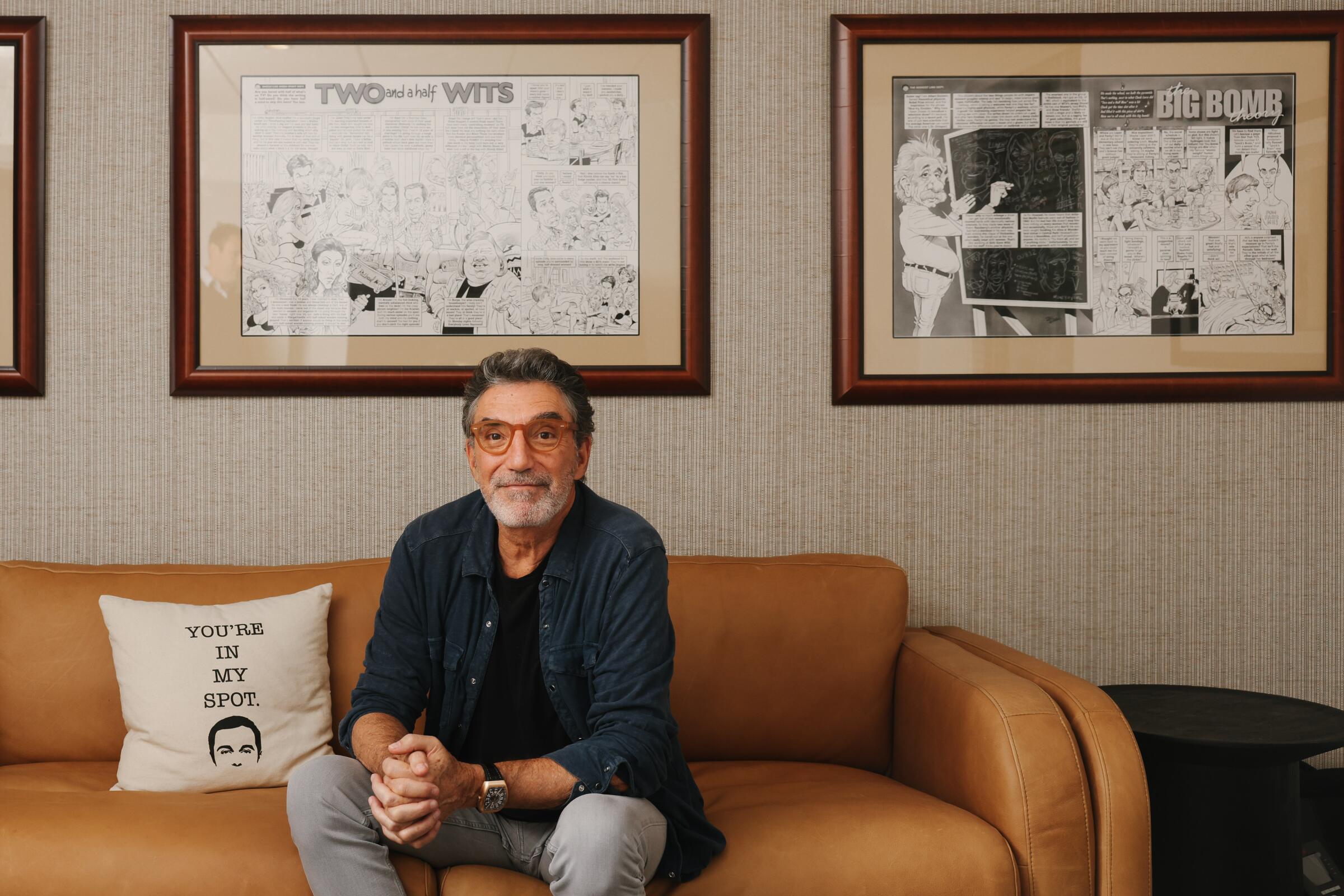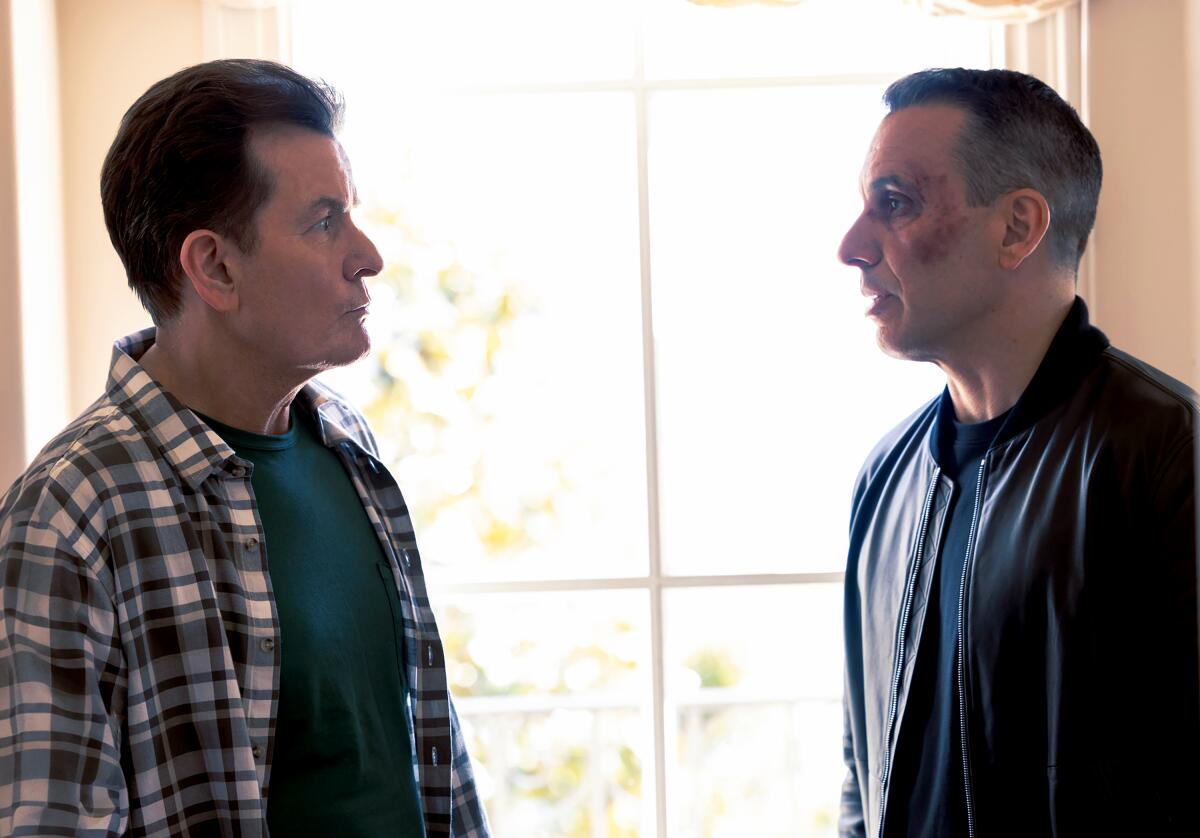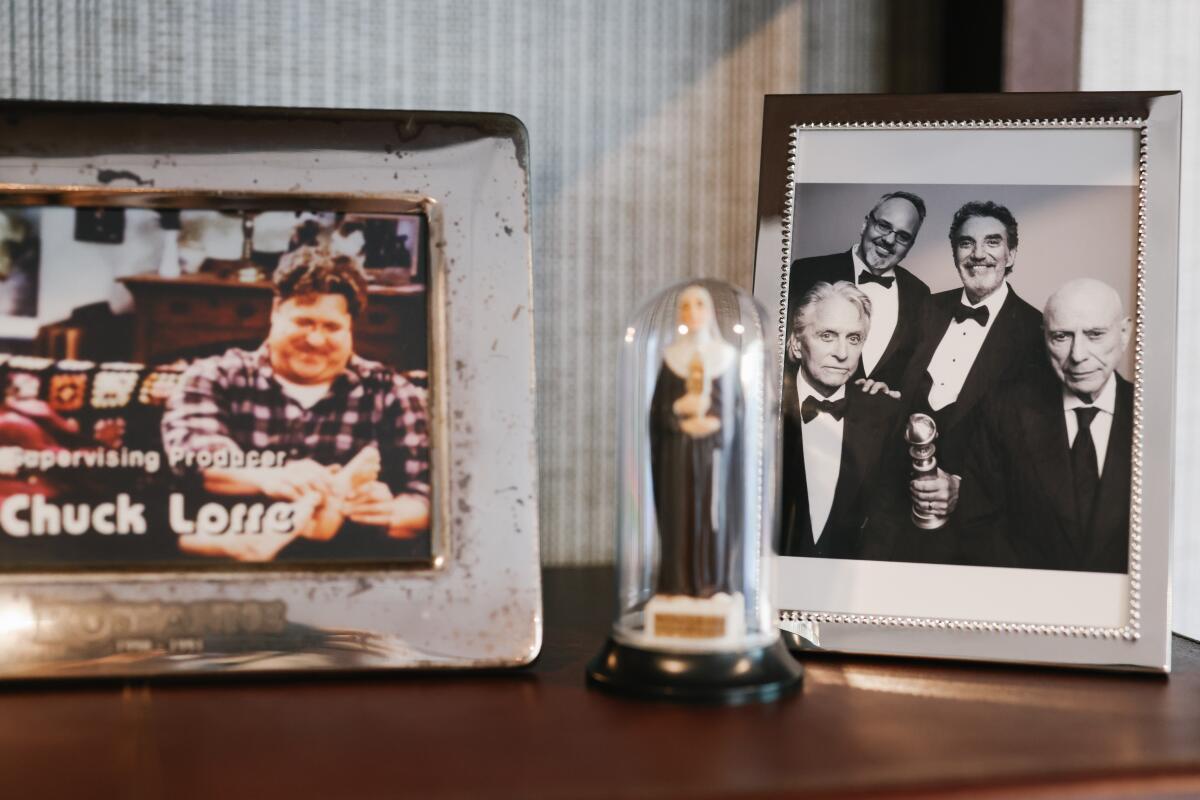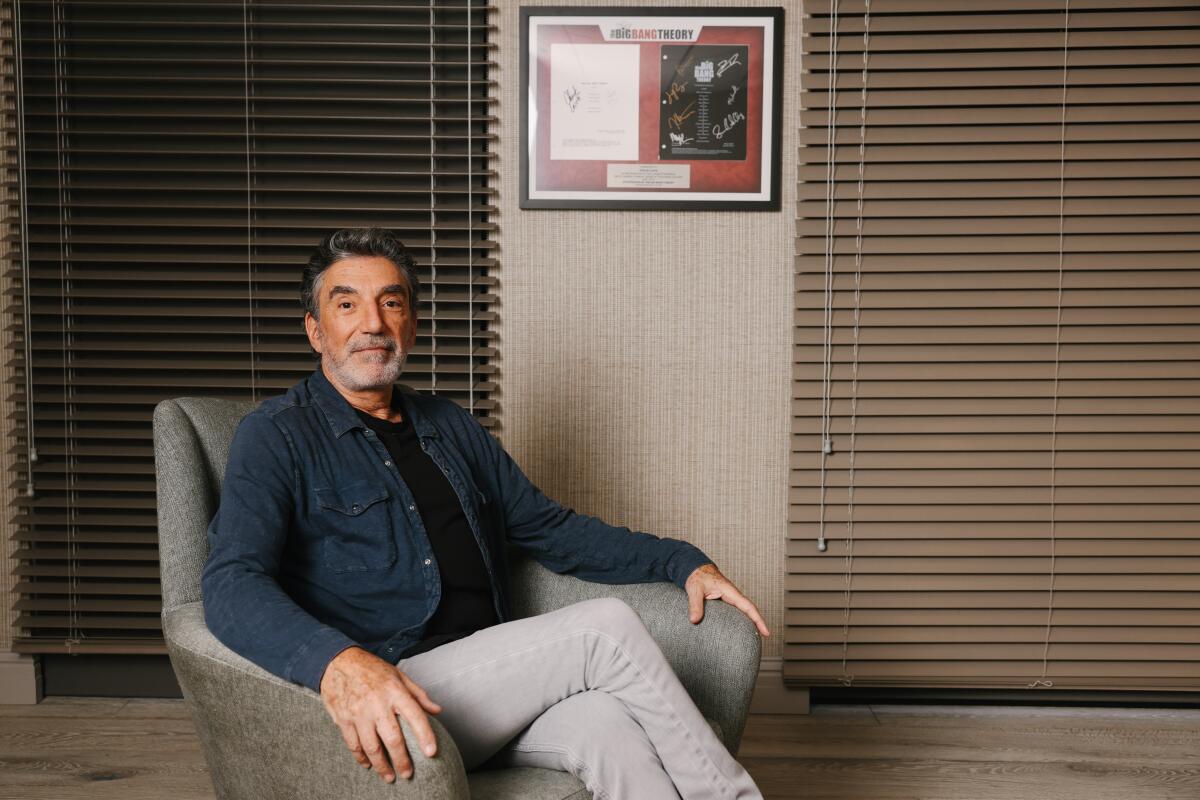The complete guide to home viewing
Get Screen Gab for everything about the TV shows and streaming movies everyone’s talking about.
You may occasionally receive promotional content from the Los Angeles Times.

When Chuck Lorre, the veteran TV producer behind such hit comedies as “Two and a Half Men,” “The Big Bang Theory” and “The Kominsky Method,” was considering bookies who operate on the fringes of legality in sports betting as the next subject to mine for laughs, it didn’t seem all that personal on the surface.
But a risky profession confronting technological advances? It’s all too familiar.
“The thing that first resonated with me about bookmaking is how it’s become a sort of anachronism,” Lorre says. “An age old profession threatened by technology and legalization. I couldn’t help feeling that there was a parallel with being a sitcom writer. When I started, there were probably 56 comedies being made every week. Now, the number is maybe six. The image that comes to mind is a dinosaur looking up at the sky, watching a meteor hurtling down and wondering if he should be concerned. And yeah, I’m the dinosaur.”
“Bookie” stars comedian Sebastian Maniscalco (“The Irishman,” “Green Book”) as Danny, a Los Angeles bookie struggling to maintain his grip on sports betting while disruption of his business looms. He’s joined by Omar J. Dorsey (“Queen Sugar,” “The Blind Side”) as Ray, a former NFL player who serves as Danny’s sidekick and enforcer.
Lorre co-created the series with frequent collaborator Nick Bakay, who has experience in the sports betting world and worked on other Lorre shows including “Mom,” “Young Sheldon” and “The Kominsky Method.”
“I really like the idea of doing a show about people who are working outside the boundaries of society,” Lorre says. “Nick and I interviewed a lot of bookies, which was really thrilling because they are wonderful characters with wonderful stories. There’s a scene in a later episode where a guy is performing open heart surgery and a nurse is holding a phone to his head in a plastic bag so that it’s sterile and he’s making a bet. The addiction seems to be benign, but it’s not. It was important to be respectful to some extent about how damaging it is.”
The first two episodes are now available to stream on Max. The season opens with some notable guest stars, including Ray Romano, as a family man whose gambling addiction is more powerful than his willpower, and in a surprising twist, Charlie Sheen, the former star of “Two and a Half Men” who famously had a bitter feud with Lorre, playing a version of himself.
Sitting in his office on the Warner Bros. lot in Burbank on a recent morning, Lorre talked about reconciling with Sheen, the writers’ strike and how streaming is different from network TV.
CBS could very well be an acronym for Chuck’s Band of Sitcoms, Chuck being Chuck Lorre, the seasoned TV show maker.

In writing the pilot script of “Bookie,” Lorre and Bakay thought it was only fitting that the show find a way to feature a Hollywood star playing a version of themselves as a high roller. After all, plenty of celebrities have been lured into the gambling world, so it’s likely a bookie would have some high-profile clients. Early drafts of the pilot simply noted the character as a “TBD” — to be determined. Lorre eventually decided it should be Sheen. The actor was fired from “Two and a Half Men” in 2011 after he publicly insulted Lorre and unleashed a series of erratic rants not long after filming was put on hold so Sheen could undergo treatment for drug addiction.
“I remember calling Nick at night and saying, ‘I think I know who should do this: Charlie.’ He rolled heavy. [Charlie] used to tell me stories on the set about some of his Sunday action. I’d be like, ‘Oh, my God. I’m nauseous just thinking about that level of stuff.’ It was a part of the world that Charlie knew a lot about. And the question was, at first: ‘Am I capable of doing this? And who knew how he’d feel about it?’ And the answer, frankly, was, ‘It’s ancient history for me.’ There came a point after about — not overnight — I’d say over 10 years that it just went away. It happened to somebody else, almost. And I went from being unable to watch the reruns [of ‘Two and a Half Men’] because it was too painful — it was deeply hurtful, embarrassing, humiliating. Then it wasn’t. I’d be comfortable working with Charlie if Charlie is comfortable working with me, and and we’re all in a good place — physically, emotionally and spiritually. With that, I called him.
“We had a terrific conversation. He was surprised. And he was gracious, and he was grateful that I was reaching out. He was eager to put it all behind us. It was like talking to an old friend that you haven’t talked to in a long time. I hate to be redundant, but there was a really healing, closure kind of thing that happened.
“Since he’s playing a fictionalized version of himself, I wanted him to be comfortable, so I sent him the script. The day of the table read, it was the first time I’d seen him in many, many years, and we hugged, and it was just kind of wonderful. Then he proceeded to sit down and just killed it. The executives from HBO Max and Warner Bros. were going, ‘Wow.’ He’s the real deal. His chops for playing comedy are impeccable, and they hadn’t diminished at all.
“As we were closer to getting into production, I was talking to him one night on the phone — we knew he was gonna run a poker game in a rehab — and we both at the same time went: ‘What if we went and got Angus?’ [Angus T. Jones played Jake Harper, the young nephew of Sheen’s character in ‘Two and a Half Men’]? Because in the pilot of ‘Two and a Half Men,’ there was a poker scene. Angus was 8 and he was annoying everybody at the poker game; he was being an adorable little boy p— off these guys who are playing poker. Angus had put acting behind after ‘Two and a Half Men,’ but he was game, and we got some of the other guys from that original poker scene. We do bring Charlie back for another episode in this first season. Sebastian’s character is having marital difficulties. And Charlie gives marital advice. It’s perfect.”
The reunion is a more tangible form of closure. In 2022, Lorre revisited his history with Sheen in a TV pilot script, “Sex, Drugs and a Sitcom,” that would have dramatized their tumultuous time working together.
“That was really me exorcising some demons, and I put that pilot away. This was better. I needed to do some housecleaning, and that script needed to be written just to get it out of my head. Maybe that was part of how that phone call was able to happen. I was over it. It’s done.”
Chuck Lorre has nailed the indignities of aging in his series “The Kominsky Method.” But he knows there’s work to be done still to open industry doors.

Lorre’s list of credits is long and storied, with him having written, produced and created more than a dozen sitcoms in a career that spans nearly four decades. His first steady television jobs were in animation, writing scripts for shows like “Muppet Babies” and “My Little Pony.” At night, he wrote spec scripts for prime-time shows like “Miami Vice” and “The Twilight Zone.” But it was one for “Golden Girls” that led to freelance work on sitcoms such as “Charles in Charge” and “My Two Dads,” before he landed his big prime-time break, in his late 30s, with “Roseanne,” which he worked on from 1990 to 1992.
“I was going to walk through any door that opened; I was determined to break into television. I actually got a meeting at ‘Miami Vice.’ I remember a meeting at Universal. And these guys were saying, ‘Well, we liked your script. But can you take all the jokes out?’ I was dumbly naive thinking I could have a conversation about it. I said, ‘Well, why can’t you do one that has a sense of humor?’ It didn’t go much further than that meeting. But I got a call. There was a first-run syndicated version of “My Two Dads” with Paul Reiser and I got to write on that as a freelancer. That first script paid me like, $5,000 and it cost $5,000 to join the Writers Guild — and I was thrilled to do it because it meant I was in the Writers Guild.... I got health insurance. It was huge. You go from being an outsider, hoping to get in, and suddenly, you’re part of this cultural establishment system that can protect you. You need protection early on, and that’s still the case. It’s too difficult otherwise.”
During the 2007-08 writers’ strike, Lorre was worried about the fate of what would become one of his most successful sitcoms, “The Big Bang Theory.” It premiered in fall 2007, to so-so ratings. And it’s outlook didn’t look promising when just half of its initial 13-episode order aired before the strike, which halted production and brought Hollywood to a standstill. In a pre-Netflix era, instead of becoming a casualty, “The Big Bang Theory” steadily built an audience as CBS aired re-runs during the strike. This year’s work stoppage lasted 146 days, the second-longest in Hollywood history.
“I like taking time off. I don’t like being told to take time off. You’ve taken away the power of choice in a strike. And there are very legitimate reasons for the strike. I’m not finding fault with the purpose of moving writing, directing and acting into the streaming era. It’s time ... Without getting stuck in the weeds [about the key terms of the new agreement], I let my feelings be known about being told what a writers’ room should look like. But the goal is legitimate. I was lucky enough to come up at a time when you could have eight, then, 12 people on the staff. And there was room for beginner writers, rookies. I benefited from that. When you’re getting started, residuals and healthcare are everything. That was the golden arch in the sky. You can afford to get your kid into a doctor’s office without going broke. And that check that you got from a summer rerun was important. Doing things like that now? Well, it’s not relevant to me in this time in my life, but it’s important to a lot of people. It was a legitimate, valid strike, and I’m thrilled that it came out as well as it did.”
Showrunner Noah Hawley discusses Season 5 of “Fargo,” which draws from the film and is set in a more recent period from past seasons, the writers’ strike and his upcoming adaptation of ‘Aliens.’

“Bookie” is Lorre’s third series on a streaming platform, following “Disjointed” and “The Kominsky Method,” both of which were for Netflix. And, like “The Kominsky Method,” it’s shot in the single-camera format, with no live studio audience.
“I was very suspicious early on about the idea of bingeing. But what I didn’t know and I discovered in talking to people who had watched the show is they would watch three, four episodes at a time. If somebody’s watching Episode 4, you know they watched [Episodes] 1, 2 and 3. You don’t know that in network television. On any given night of a network comedy, you don’t know if they were there last week and if those stories connect; the best you can do is ‘previously on.’”
For a veteran writer and producer who came up in the broadcast network system, adapting to the streaming era and embracing single-camera comedies has been a revelatory shift to the routine he had grown accustomed to for so long.
“To my horror, my first drafts as a writer were not perfect. And in a writers’ room, I saw them get way better. I didn’t want it to be true. But a group of great comedy writers tearing my script apart made it much, much better. That was a lesson in humility. Fast forward, I did ‘The Kominsky Method’ — I wrote pretty much all of them myself. I wanted to see if I could, because in the beginning, when you’re trying to break in, you write by yourself. And then you spend 25 years in a room with other people and suddenly there has to be a consensus; people debate: This is good, this is bad. It’s this cauldron of opinions. And yes, it makes it better, but it’s a different process.
“With ‘Kominsky,’ I wanted to see if I could still sit in a room by myself, because I’d been sitting in a room with other people for 30 years. And I really loved it. Writing, in any other world, is a solitary profession. Only in television, with a writers’ room, is it a group effort. I was on set all the time, every scene, every episode, making Alan Arkin and Michael Douglas absolutely crazy because I kept running over to change things. I can remember having the headphones on and as I’m walking toward the set, hearing Alan say to Michael, ‘Oh, God. Here he comes.’ And I’m like, ‘No, no, no. I really can make the scene better.’ Why would you waste the opportunity? If I think I can make it better, why wouldn’t I do that? That’s the four-camera education, it doesn’t leave you.
“When you don’t have that audience to tell you, ‘You failed’ when you’re shooting single-camera — I did this on ‘Kominsky,’ and I did it on ‘Bookie’ — I’m there every second, and I’ll run over and ask the actors to make some changes. I don’t want to find out in the editing bay that the scene doesn’t work out. I don’t want to edit my way into success. I want to shoot successful comedy, then editing will be a plus to it. The magic of editing is a terrific thing, but it can’t replace the scene work.”
The complete guide to home viewing
Get Screen Gab for everything about the TV shows and streaming movies everyone’s talking about.
You may occasionally receive promotional content from the Los Angeles Times.